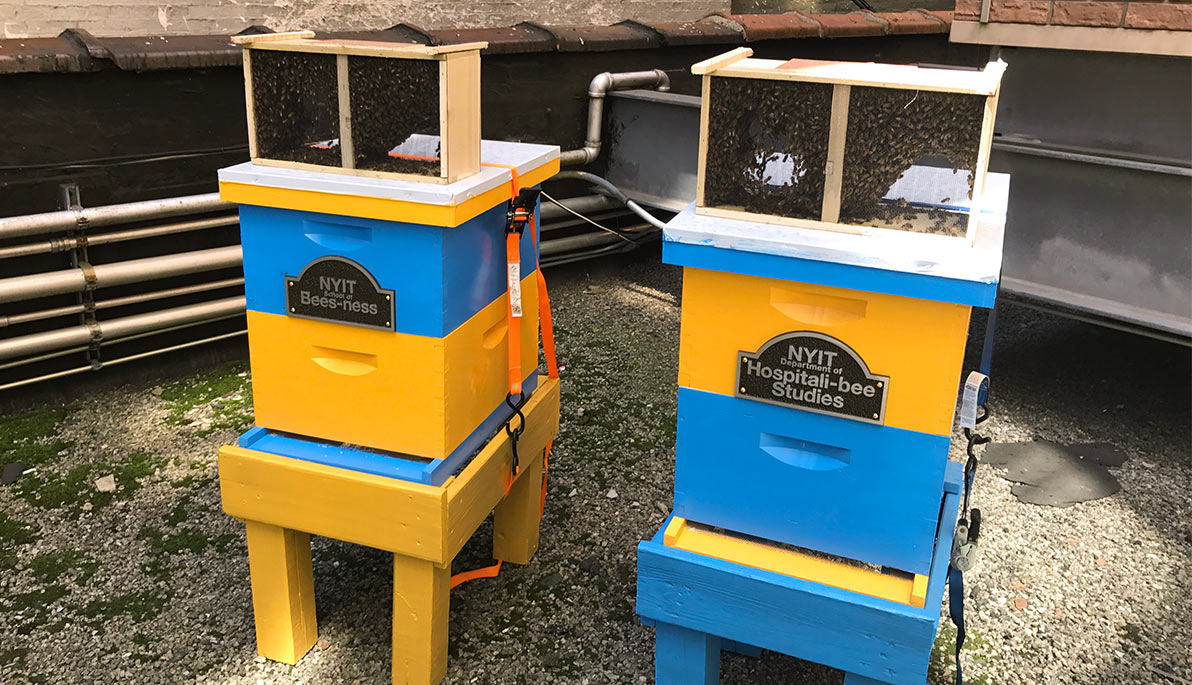
What’s the Buzz About the Roof of 1849 Broadway?
April 21, 2017
If you hear a buzz around and about the Manhattan campus this spring, try looking up. No, New York City is not being attacked by bees, but you may see a few of the invited guests who have taken residence on the rooftop of the Student Activities Building. As part of a hospitality management project at NYIT School of Management, two 400-pound beehives, which house 12,000 bees, were installed at 1849 Broadway in early April.
The hives and their inhabitants will be incorporated in three hospitality management courses: Purchasing, Procurement, and Supply Management; Experiential Based Learning: Practicum Sustainability in Hospitality Management; and Food Culture and Contemporary Issues.
To install the hives, Robert Koenig, Ed.D., associate professor and chair of hospitality studies, and Patthara Chandaraggha, student advisement specialist, worked with Andrew Cote of Silvermine Apiary LLC, a family beekeeping operation in existence since the 1800’s.
Many businesses, such as hotels and restaurants, are installing beehives on the rooftops of their urban locations in an effort to promote sustainability. “Beehives help preserve the environment, protect it, and enhance our communities,” Koenig said. Cote, who manages beehives on the rooftops of the Museum of Modern Art, The Waldorf Astoria Hotel, and One Bryant Park, among others, will assist the students with management, care, feeding, honey extraction, and bottling.
“It’s always been a vision of mine that our programs and students remain at the forefront of the hospitality industry,” said Koenig on why he wanted to develop this initiative. “It’s so important that students know and understand about sustainability and the farm-to-table movement.”
Bee populations around the world are on the decline due to industrial agriculture, parasites/pathogens and climate change. “The loss of biodiversity due to monocultures and the wide-spread use of bee-killing pesticides are particular threats for honeybees and wild pollinators,” explained Koenig. “These issues will be addressed in the courses taught on sustainability, as well as within future academic and professional presentations we will be doing about our rooftop hives.”
In their coursework, students will use the beehives in a variety of ways. For example, the Purchasing, Procurement, and Supply Management class will focus on management and distribution of the honey; students in Experiential Based Learning: Practicum Sustainability in Hospitality Management will use case studies to find out how hotels incorporate sustainability within their business models and observe first-hand the effects that the beehives have on the community; and the students in Food Culture and Contemporary Issues will learn about the farm-to-table movement and practices and the important role bees play in the environment.
In addition, the beehives will produce honey, which students will extract and distribute, giving them more hands-on experience with beekeeping and managing and marketing a product. “After the first year, we should generate about 50–100 pounds of pure honey,” said Koenig. The students are in the process of selecting a jar and designing a label. All of the proceeds will go towards the Bee-lieve Hospitality Scholarship Fund for hospitality management students.
“We believe this will be an exceptional learning experience for our students, as well as enhance our sustainability efforts for the NYIT community,” said Koenig. “I want to make sure this remains an NYIT initiative. It’s important that we contribute to the community and educate our students.”
More Features

An Alumnus’ Commitment to the Environment
As an energy management graduate from New York Tech’s Vancouver campus, Jasdeep Gulati (M.S. ’22) is highly invested in educating people about environmental and climate sustainability.

Vancouver Faculty Win University-Sponsored Research Awards in New Program
The new Global Impact Research Grant (GIRG) program has been developed to keep Vancouver-based faculty connected to faculty and research projects being conducted on the university’s New York campuses.

Studying Climate Change One Degree at a Time
Junhua Qu (M.S. ’24) began her collegiate journey in Beijing. But, her interest in climate change took her to New York Tech’s Vancouver campus to study energy management.
